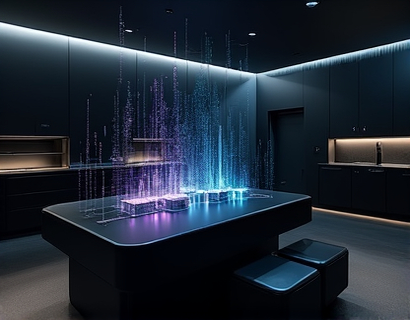Elevate Your Mind: Discovering Cutting-Edge Meditation Software for Stress Relief and Relaxation
In today's fast-paced world, stress has become an almost constant companion for many individuals. The relentless demands of work, personal responsibilities, and the continuous influx of information can lead to mental fatigue and a sense of being overwhelmed. Finding effective ways to manage stress and cultivate mindfulness is crucial for maintaining mental well-being and achieving a balanced life. One powerful tool that has gained significant attention in recent years is meditation software designed to guide users through the process of relaxation and mindfulness. This article explores the benefits of using advanced meditation software to elevate your stress management and mindfulness practice.
Understanding the Importance of Mindfulness and Meditation
Mindfulness and meditation are practices that have been used for centuries to promote mental clarity, emotional stability, and overall well-being. Mindfulness involves being fully present and aware of the current moment, without judgment. Meditation, on the other hand, is a structured practice that helps quiet the mind and foster a deeper connection with oneself. Both practices have been extensively studied and have been shown to reduce stress, anxiety, and depression while improving focus, emotional regulation, and overall quality of life.
In modern times, the benefits of mindfulness and meditation are more relevant than ever. The constant connectivity and information overload can lead to chronic stress, which, if left unmanaged, can have severe health consequences. Meditation software offers a convenient and accessible way to integrate these practices into daily life, making it easier for individuals to reap the benefits of mindfulness and meditation.
Features of Cutting-Edge Meditation Software
Modern meditation software is designed to cater to a wide range of users, from beginners to experienced practitioners. These platforms offer a variety of features that enhance the meditation experience and support a consistent practice.
Guided Sessions: One of the most valuable features of meditation software is the availability of guided sessions. These sessions are led by experienced instructors who guide users through each step of the meditation process. Whether you are new to meditation or looking to deepen your practice, guided sessions provide structure and support, helping you stay focused and engaged.
Calming Soundscapes: Sound plays a crucial role in creating a conducive environment for meditation. Meditation software often includes a library of calming soundscapes, such as nature sounds, white noise, and gentle music. These soundscapes help mask distracting noises and create a peaceful atmosphere, making it easier to enter a meditative state.
Mindfulness Tools: In addition to guided sessions and soundscapes, meditation software provides various mindfulness tools. These tools can include breathing exercises, body scans, and mindfulness prompts that encourage users to stay present and aware. Mindfulness tools are particularly useful for integrating mindfulness into daily activities, such as eating, walking, or even working.
Personalization Options: Recognizing that each individual's needs and preferences are unique, meditation software often offers customization options. Users can choose the length of sessions, select specific themes or topics, and adjust the intensity of the practice. This personalization ensures that the meditation experience is tailored to the user's current state and goals.
Progress Tracking: To help users stay motivated and monitor their progress, meditation software includes features for tracking practice habits and milestones. These tools can provide insights into consistency, duration, and even the emotional impact of regular meditation. Seeing progress can be a powerful motivator, encouraging users to continue their practice.
Benefits of Using Meditation Software
The integration of meditation software into your daily routine can bring numerous benefits, both mentally and physically.
Firstly, regular use of meditation software can significantly reduce stress levels. By providing structured guidance and creating a calming environment, these tools help lower the production of stress hormones like cortisol. Over time, this can lead to a more relaxed and resilient mindset, better equipped to handle life's challenges.
Secondly, meditation software can improve focus and concentration. The practice of mindfulness trains the mind to stay present, reducing the tendency to get distracted by thoughts and external stimuli. This enhanced focus can translate into better performance in work and other activities, leading to increased productivity and efficiency.
Thirdly, meditation has been shown to enhance emotional well-being. Regular practice can lead to greater emotional stability, reduced symptoms of anxiety and depression, and a more positive outlook on life. The self-awareness gained through mindfulness helps individuals understand and manage their emotions more effectively.
Additionally, meditation can have physical health benefits. Studies have linked regular meditation to lower blood pressure, improved immune function, and better sleep quality. By reducing stress and promoting relaxation, meditation software can contribute to overall physical health and well-being.
How Meditation Software Works
Meditation software typically operates through a user-friendly interface accessible via desktop or mobile devices. Here’s a step-by-step overview of how it works:
1. Account Creation: Users start by creating an account on the meditation platform. This usually involves providing basic information and setting up a profile.
2. Exploring Content: Once logged in, users can browse through a wide range of meditation sessions and mindfulness tools. The content is often categorized by theme, duration, and level of difficulty, making it easy to find sessions that suit their needs.
3. Selecting a Session: Users can choose a guided session based on their current state or goal. For example, they might select a session for stress relief, sleep improvement, or focus enhancement.
4. Starting the Session: Upon selecting a session, users are guided through the process. The session typically begins with an introduction, followed by instructions for breathing, body positioning, and meditation techniques. Background soundscapes play in the background to create a calming atmosphere.
5. Tracking Progress: After completing a session, users can log their experience and track their progress over time. Some platforms also offer reminders and notifications to encourage consistent practice.
6. Community and Support: Many meditation platforms include community features, such as forums or groups, where users can share experiences, ask questions, and support each other. This community aspect can be particularly beneficial for those new to meditation, providing a sense of belonging and motivation.
Getting Started with Meditation Software
For individuals looking to incorporate meditation into their daily routine, getting started with meditation software is straightforward and accessible.
First, choose a meditation platform that aligns with your needs and preferences. There are numerous options available, each with its own set of features and content. Some popular platforms include Headspace, Calm, and Insight Timer, among others. Research and read reviews to find a platform that resonates with you.
Once you've selected a platform, create an account and familiarize yourself with the interface. Spend some time exploring the available sessions and tools to get a sense of what’s offered. Start with beginner-friendly sessions to build a foundation in meditation and mindfulness.
Consistency is key when it comes to reaping the benefits of meditation. Aim to practice regularly, even if it’s just a few minutes each day. Over time, you can gradually increase the duration and frequency of your sessions as you become more comfortable with the practice.
It’s also helpful to establish a dedicated space for meditation, free from distractions. This could be a quiet corner in your home, a peaceful outdoor spot, or any place where you feel comfortable and relaxed.
Incorporating Meditation into Daily Life
While meditation software provides a structured and guided approach, integrating mindfulness into daily activities can further enhance the benefits. Here are some practical ways to bring mindfulness into your everyday routine:
- Mindful Breathing: Take a few moments each day to focus on your breath. Inhale deeply through your nose, hold for a few seconds, and exhale slowly through your mouth. This simple practice can be done anywhere and helps center your mind.
- Mindful Eating: Pay attention to the taste, texture, and aroma of your food. Chew slowly and savor each bite. This not only enhances the eating experience but also aids digestion.
- Mindful Walking: During your daily walks, focus on the sensation of your feet touching the ground, the movement of your body, and the surroundings. This can transform a routine activity into a meditative experience.
- Mindful Breaks: Take short breaks throughout the day to pause, breathe, and observe your thoughts and feelings without judgment. This can help reduce stress and increase productivity.
By combining the use of meditation software with these mindfulness practices, you can create a comprehensive approach to stress relief and mental well-being.
Conclusion
In a world where stress and mental fatigue are increasingly common, meditation software offers a powerful tool for enhancing mindfulness and reducing stress. By providing guided sessions, calming soundscapes, and mindfulness tools, these platforms empower individuals to integrate relaxation and self-awareness into their daily lives. Whether you are a beginner or an experienced practitioner, meditation software can be a valuable ally in your journey towards a more balanced and fulfilling life.










































